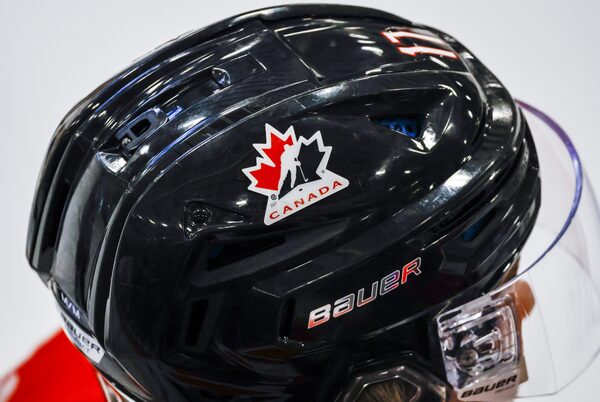
A Hockey Canada logo on the helmet of a national junior team player during a training camp practice in Calgary on Aug. 2.Jeff McIntosh/The Canadian Press
It’s fair to say that Hockey Canada does unusual things – for instance, and this is just off the top of our head, maintaining a secretive fund to settle lawsuits related to alleged sexual assaults committed by junior hockey players.
So once you’ve gone that far, there’s little motivation to skate back onside and play as if the rules apply to you. Which may explain why, to use an expression from the sport it has so much control over in this country, Hockey Canada is ragging the puck while losing the game.
Having been called out for quietly settling a $3.55-million lawsuit with a woman who alleged that she was sexually assaulted, while intoxicated, by multiple players – including members of Canada’s 2017-18 World Junior gold-medal team – in a hotel room in London, Ont., in 2018, then getting caught using the fees of its 650,000 registered players, many of them children, to settle similar outrages, and then being hit with allegations of another group sexual assault involving World Junior players in Halifax in 2003, you’d think Hockey Canada would understand the score.
Instead, it said last week that it had hired a retired Supreme Court of Canada judge, Thomas Cromwell, to “lead an independent review of the organization’s governance structures and systems.” The review will produce an interim report in time for Hockey Canada’s annual meeting in November.
Passing the biscuit back and forth in your own end in the dying minutes of a game you’re losing is only done if you’ve given up all hope of coming back. In this case, the judge’s review will likely just delay the inevitable: the shakeup of a leadership team that has lost the trust of Canadians – a shakeup that began Friday when the chair of Hockey Canada’s board of directors suddenly resigned.
A poll conducted for The Globe and Mail by Nanos Research found last week that seven out of 10 Canadians are angry that Hockey Canada didn’t tell parents and players how its National Equity Fund, financed by their registration money, was being used, and that they also opposed their fees being spent on sexual-assault settlements.
This is a resounding rejection of the judgment of the people at the top of Hockey Canada, an organization that is central to the development of the game, and of players, in this country, and which has fingers in the sport at every level below professional.
It is the culmination, too, of a slow leak in the confidence people have in Hockey Canada and in the Canadian Hockey League, which runs major-junior hockey. The two organizations most involved in the development of National Hockey League prospects in Canada have been failing on and off the ice for years.
As this page recently noted, where the NHL was once dominated by Canadians who came up through the major-junior ranks, these days more than half the league’s total roster is made up of American and European players. In the 2022 entry draft last month, only nine of the 32 players taken in the first round were Canadians.
As well, the CHL is being sued by former major-junior players who contend that teams, their owners and their management ignored, and even supported, humiliating hazing rituals that saw teenagers submitted to “systematic physical, mental and sexual abuse” – a well-known practice forced into plain sight by the lawsuit.
The CHL has since done an independent review, released in January, that found that “off-ice misconduct” was a “cultural norm” in the league, and that it was protected by a “code of silence” enforced by the very real threat that a player’s career could be harmed if he spoke up.
And now Hockey Canada has released an “action plan” to “shatter the code of silence and eliminate toxic behaviour in and around Canada’s game,” part of which involves the independent review announced last week.
It’s all so little, and so late. One of the chief questions Mr. Cromwell will ask, according to Hockey Canada, is this: “Was Hockey Canada’s use of the National Equity Fund to fund uninsured liabilities … appropriate?”
Canadians have made it clear what they think; a review by a judge is not going to change their mind or rebuild their trust.
The problems at Hockey Canada start with the people who run it. They are the culture, and by their own admission the culture needs to reform. Enough passing the puck. Time for a line change.
Keep your Opinions sharp and informed. Get the Opinion newsletter. Sign up today.